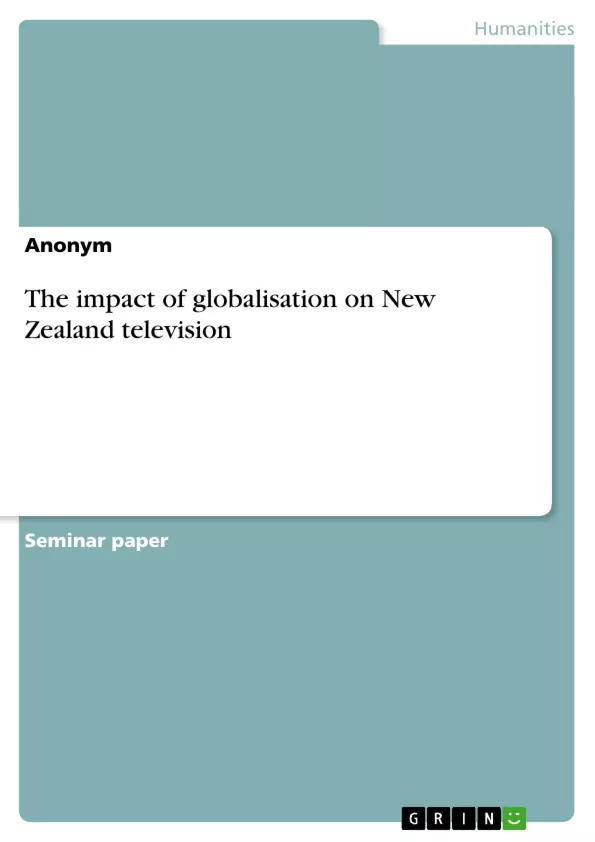New Zealand is a small country in the southern hemisphere, close to the South Pole. It consists of two islands; the smaller North Island is the more populated one of the two; it also holds the capital and the largest city. In fact the country has ten times more sheep than inhabitants. It was the last place in the world to be settled by humans; it was also one of the last countries to get television. It is the democratic country with the most unregulated media policy. But globalisation even reaches into this part of the world…
Globalisation is often political. State regulation of media and popular culture is a political tool, either to fight off or to invite globalised cultural artefacts. But also the act of exporting cultural products is political. The aim of this paper is to look at the impact of globalisation on the media industry of New Zealand. It investigates the interrelation between media policy, media ownership, and media effects. Furthermore, it examines the form and content of television programs in New Zealand. This country was selected for a case study due to its unique media regulation. Moreover, its geographic, economic, and cultural peculiarities make it an interesting case for investigation. The first part of the paper provides the theoretical background for discussing the media situation in New Zealand. It introduces and briefly discusses the major perspectives on globalisation.
Inhaltsverzeichnis (Table of Contents)
- The Impact of Globalisation on New Zealand Television
- Perspectives on Globalisation
- Television in New Zealand
- References
- Consulted Websites
Zielsetzung und Themenschwerpunkte (Objectives and Key Themes)
This paper aims to examine the impact of globalization on the media industry in New Zealand, specifically focusing on television. It explores the interplay between media policy, ownership, and effects, and analyzes the content and format of television programs in New Zealand. The study utilizes the unique media regulations, geographical, economic, and cultural characteristics of New Zealand to provide an insightful case study.
- The impact of globalization on media policy and regulation
- The role of media ownership in shaping television content
- The effects of globalization on the form and content of New Zealand television
- The influence of global media conglomerates on local television programming
- The interplay of globalization and local cultural identity in the context of New Zealand television
Zusammenfassung der Kapitel (Chapter Summaries)
- The Impact of Globalisation on New Zealand Television: This chapter introduces the context of globalization's influence on New Zealand television, highlighting the country's unique media landscape and its position as a small nation amidst global media forces. It discusses the political dimension of globalization and its impact on media regulation and cultural products.
- Perspectives on Globalisation: This chapter delves into theoretical perspectives on globalization, examining the paradigm of cultural imperialism and its implications for the media. It explores the concept of glocalization and hybridity, highlighting the complex interplay between global and local forces in shaping cultural identities.
- Television in New Zealand: This chapter provides a detailed analysis of the media landscape in New Zealand, focusing on the four major television channels. It examines their programming, analyzes selected shows, and considers the role of media policy, ownership, and effects in shaping the media situation.
Schlüsselwörter (Keywords)
The key concepts explored in this work include globalization, media industry, television, New Zealand, media policy, media ownership, media effects, cultural imperialism, glocalization, hybridity, and media conglomerates. These terms highlight the central themes of the paper, focusing on the impact of global forces on the development and characteristics of television in New Zealand.
Frequently Asked Questions
How has globalization impacted New Zealand television?
Globalization has led to an influx of global cultural artifacts, influenced media ownership, and challenged local cultural identity through deregulated media policies.
What is unique about New Zealand's media policy?
New Zealand is noted for having one of the most unregulated and market-driven media policies among democratic countries.
What is the concept of "glocalization" in this context?
Glocalization refers to the adaptation of global media formats to local cultural contexts, creating hybrid television programs that blend both influences.
Which major TV channels are analyzed in the study?
The paper provides a detailed analysis of the four major television channels in New Zealand, examining their programming and ownership structures.
Does cultural imperialism play a role in New Zealand TV?
Yes, the study examines how global media conglomerates exert influence over local content, often leading to a dominance of international (primarily US) media products.
- Quote paper
- Anonym (Author), 2007, The impact of globalisation on New Zealand television, Munich, GRIN Verlag, https://www.grin.com/document/78229



